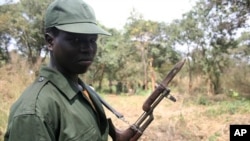JUBA, SOUTH SUDAN —
South Sudan has accused Khartoum of launching a deadly attack on a border area in Upper Nile at the weekend, in which one South Sudanese soldier was killed and four others wounded.
But Khartoum has dismissed the accusations as “completely incorrect”, and denied that any attack took place.
According to SPLA spokesman Philip Aguer, South Sudanese forces drove back a ground assault Saturday by the Sudanese Armed Forces (SAF) on the area of Babanusa, north of the Upper Nile state capital Malakal and around 20 kilometers inside South Sudan.
“After they were repulsed, they ordered air bombardment and two gunship strikes on the base. The result of the air raid was one SPLA killed and three wounded,” Aguer said.
“They came and hit the area again at around noon, wounding a fourth soldier,” he added.
SAF spokesman Sawarmi Khaled Saad was quoted by the French news agency, AFP, as dismissing the accusations of aggression by Khartoum as “completely incorrect.”
"We didn't bombard any area inside South Sudan's border and we didn't have any military operation there. Nor do we have a war or aggression against South Sudan," Saad was quoted as saying.
The clash was the third in the Babanusa area since November, Aguer said.
Upper Nile, in the northeast corner of South Sudan, shares more than half of its border with Sudan, and is bordered on the southeast by Ethiopia.
South Sudan became independent in 2011 after a 22-year civil war with the north, but the two sides have not finished demarcating their 1,800-kilometer border.
Juba regularly accuses Khartoum of attacking its bases and violating its air space, while the north says the south is backing rebels groups operating inside Sudan.
But a key bone of contention between the two sides since South Sudan became independent has been the border areas, especially where the long frontier cuts through areas known to be rich in oil and other natural resources.
South Sudan took about three-quarters of the once-unified nation’s oil when it became independent, and shut down all oil production a year ago in a dispute with Khartoum. The dispute was over oil fees charged by the north for crude from landlocked South Sudan, which must pass through Sudanese pipelines and ports to reach international markets.
An African Union-mediated agreement to resume oil production was signed in late September, but has never been implemented. The September agreement also called for both sides to withdraw troops from frontier areas that are still heavily disputed by both countries, and which last year nearly plunged the two Sudans back into war.
But Khartoum has dismissed the accusations as “completely incorrect”, and denied that any attack took place.
According to SPLA spokesman Philip Aguer, South Sudanese forces drove back a ground assault Saturday by the Sudanese Armed Forces (SAF) on the area of Babanusa, north of the Upper Nile state capital Malakal and around 20 kilometers inside South Sudan.
“After they were repulsed, they ordered air bombardment and two gunship strikes on the base. The result of the air raid was one SPLA killed and three wounded,” Aguer said.
“They came and hit the area again at around noon, wounding a fourth soldier,” he added.
SAF spokesman Sawarmi Khaled Saad was quoted by the French news agency, AFP, as dismissing the accusations of aggression by Khartoum as “completely incorrect.”
"We didn't bombard any area inside South Sudan's border and we didn't have any military operation there. Nor do we have a war or aggression against South Sudan," Saad was quoted as saying.
The clash was the third in the Babanusa area since November, Aguer said.
Upper Nile, in the northeast corner of South Sudan, shares more than half of its border with Sudan, and is bordered on the southeast by Ethiopia.
South Sudan became independent in 2011 after a 22-year civil war with the north, but the two sides have not finished demarcating their 1,800-kilometer border.
Juba regularly accuses Khartoum of attacking its bases and violating its air space, while the north says the south is backing rebels groups operating inside Sudan.
But a key bone of contention between the two sides since South Sudan became independent has been the border areas, especially where the long frontier cuts through areas known to be rich in oil and other natural resources.
South Sudan took about three-quarters of the once-unified nation’s oil when it became independent, and shut down all oil production a year ago in a dispute with Khartoum. The dispute was over oil fees charged by the north for crude from landlocked South Sudan, which must pass through Sudanese pipelines and ports to reach international markets.
An African Union-mediated agreement to resume oil production was signed in late September, but has never been implemented. The September agreement also called for both sides to withdraw troops from frontier areas that are still heavily disputed by both countries, and which last year nearly plunged the two Sudans back into war.




















